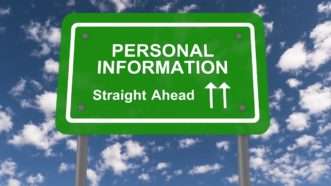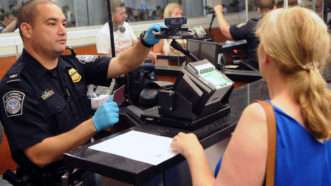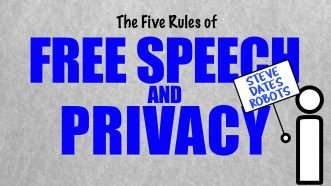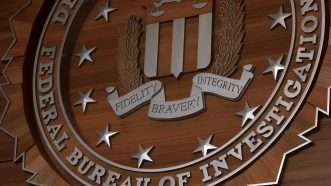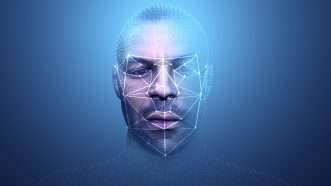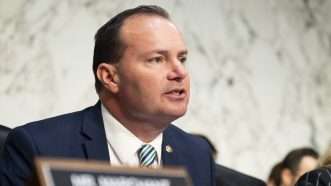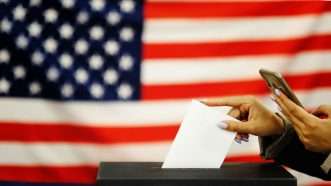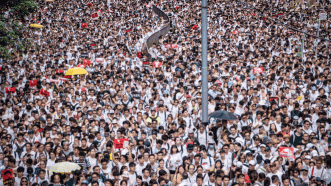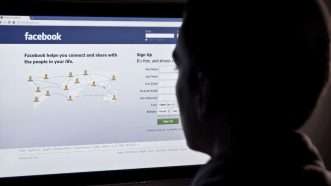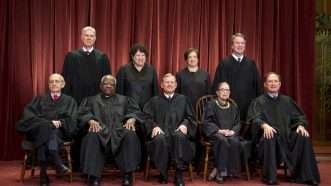Privacy
Australia Moves To Restrict Cash and Build Up Its Surveillance State
It’s all part of the international push by officials to monitor the public. You’re next.
Lindsey Graham Wants to Use Mistrust of Big Tech To Destroy Your Right to Online Privacy
Online platforms would have to "earn" speech protections by compromising encryption—all in the name of fighting child porn.
40 Privacy Groups Ask Federal Oversight Agency To Push for Suspension of Federal Facial Recognition Technology
40 privacy advocacy groups send open letter to agency
House Moves To Give Homeland Security More Power To Snoop
Plus: Santa Cruz decriminalizes shrooms, the feds target medical marijuana in Michigan, "the growing threat to free speech online," and more...
Lawmakers Say the FBI's Problematic Carter Page Warrants Require Congressional Surveillance Reforms
A bipartisan coalition wants to restrain secret snooping and create more independent oversight of the secretive FISA Court.
Trump and Comey Are United Against Encrypted Communications
Don’t worry—America’s ruling factions still disagree over who should be in charge of the snooping.
LAPD Chief Says Its Gang Database Abuse Scandal Now Has 'Criminal Aspects'
At least 20 officers have been suspended while the LAPD investigates the placement of innocent motorists on the gang database.
The FBI Wants Access to a Mass Shooter's iPhone. Will They Demand a Back Door?
A deadly shooting on a Naval base in Florida may lead to a new battle against encryption.
The First Amendment and Privacy: Free Speech Rules (Episode 9)
Episode 9 of Free Speech Rules, a video series by UCLA Law Professor Eugene Volokh
LAPD Officers Falsely Identified Drivers as Gang Members To Boost Their Numbers
Chief Michel R. Moore: "There is no place in the Department for any individual who would purposely falsify information on a Department report."
Requiring Psychotherapists to Report Patients' Child Porn Use May Violate Constitutional Right to Privacy
So concludes the California Supreme Court (by a 4-3 vote), applying the California Constitution; it remands for further fact-finding on the law's practical costs and benefits.
Are California's New Data Privacy Controls Even Legal?
A new paper raises constitutional questions about expansive state-level regulations that reach beyond their borders.
If You Think Encryption Back Doors Won't Be Abused, You May Be a Member of Congress
In the middle of a scandal over FISA surveillance, leaders want still more power to snoop on your secret stuff.
It's Bill of Rights Day. Do Americans Still Care?
The greatest threat to protections for our freedom may be people's fear that people who disagree with them are exercising their rights.
Right To Be Forgotten
Sharyn Rothstein's sharp new play is a smart and timely look at how to balance free speech and privacy in a wired age.
The FBI Will Be Audited To See How Frequently They Screw Up Other FISA Warrants
Was what happened with Carter Page an anomaly or does the agency regularly leave out important information?
Devin Nunes Supports Secret Surveillance of Americans, Finds Himself Under Surveillance
Nunes attacked those who wanted to restrain NSA’s snooping. Clearly he never considered whether his call records would be exposed.
All U.S. Travelers Abroad Should Submit to Facial Recognition Scans, Says Homeland Security
Plus: "Right to be forgotten" follies, research on direct cash aid, Elizabeth Warren on sex work, and more...
Senators Introduce Bill To Limit Facial Recognition Technology—but Does It Go Far Enough?
The legislation would require warrants for extended surveillance, but look at what it explicitly OKs.
California School Shooting Leads to Renewed Demands for Assault Weapons Ban
Plus: Uber and Los Angeles transit regulators go to war over user data, young adult novelists cancel critic, and ex-ambassador testifies in impeachment hearings.
Judge Rules Feds Need Reasonable Suspicion Before Searching Tech Devices at the Border
Fourth Amendment protections against warrantless searches are reduced when entering the country, but they’re not completely erased.
As Times Change, the FBI's Snoopy and Heavy-Handed Ways Continue
The bureau has a long history of escaping accountability for intrusive and abusive action.
A Tale of Two Tech CEOs: How Zuckerberg and Dorsey Differ with Cryptocurrency
Twitter CEO's connection to Bitcoin-friendly tools suggests more commitment to privacy than Facebook's Libra proposal.
L.A. to Uber: Either Hand Over Realtime Data on Scooter Riders or Get Out of Town
The Los Angeles Department of Transportation's data-sharing requirements for dockless mobility companies have been criticized for invading users' privacy and violating state law.
Can Big Tech Save Us From the Power of Government?
WhatsApp (and owner Facebook) sues to protect users from malicious surveillance from officials.
'Data Portability' Bill Would Risk User Privacy and Crush Social Media Startups
Plus: Court says scraping social media profiles is not hacking, and more...
What 'Rights' Do We Have When We're Talking About Our Private Online Data?
Defining terms is tricky, particularly when governments with bad track records on privacy want to call the shots.
The Attorney General Is Determined to Undermine Your Privacy
The encryption limits that the Justice Department demands in the name of security would make all of us less secure.
Minor's Slander Lawsuit Against Another Minor, Prompted by Defendant's Allegations of Rape
Are parents liable for defamation by their minor children?
The Same FBI That Wants To Destroy Encryption Is Still Illegally Snooping on Americans
Years after surveillance reforms, federal personnel can’t seem to comply with the Fourth Amendment.
Privacy for Rights Isn't a Trade Americans Should Be Forced To Make
Should participation in an election hinge on a voter's identity being made public? Of course not.
Hong Kong Protesters Combat the Surveillance State
Encryption, other privacy measures, and decentralization have made the protest movement possible.
Children, Refugees, and Anyone Booked by ICE Will Have DNA Added to Criminal Database
Plus: Parents sue Illinois child services, Pennsylvania mulls liquor-store weed sales, Giuliani consorts with Manafort, and more...
Should You Be Able To Leave Facebook With All of Your Connections?
When online privacy faces off against portability
Edward Snowden's Autobiography Makes a Plea for the Fourth Amendment, the Right to Privacy, and Encryption
America's most famous whistleblower calls for restricting the power of government.
States Take Antitrust Aim at Big Tech
Everybody’s going after Google and Facebook. But how do you prove they’re harming consumers?
N.M. Abolishes Marital Communication Privilege, Based in Large Part on Feminist Arguments
New Mexico will apparently now be the only state in which spouses may generally testify about confidential statements made during the marriage.
The Supreme Court's Next Big Fourth Amendment Case
What’s at stake in Kansas v. Glover.
Trump Mulls Orwellian Proposal to Stop Mass Shootings by Monitoring 'Mentally Ill People' for Signs of Imminent Violence
The program would try to develop a surveillance system based on predictive tests that don't exist.
Did You Download an App that Connects to Your Rifle Scope? If So, the Justice Department Wants to Know Who You Are.
Feds go fishing for private data in order to track down illegal exporters.
Feds to YouTube: No More Cookies for Children!
The Federal Trade Commission's settlement with YouTube will cripple online video functionality.
How Your Digital Purchases Could Serve the Perfect Surveillance Network
You may be surprised how many different companies know whenever you use your credit card.
The Government Wants a 'Red Flag' Social Media Tool. That's a Terrible Idea.
The FBI is looking for companies to comb through social media posts and pinpoint possible threats ahead of time. Think of it like a meme-illiterate Facebook-stalking precog from Minority Report.
Privacy-Friendly Fashion for a Surveillance-State Age
You can literally wear your principles on your sleeve while baffling facial recognition technology.
Another Federal Court Allows Warrantless Cellphone Searches at U.S. Border
It’s time for SCOTUS to revisit the "border search exception" to the Fourth Amendment.

